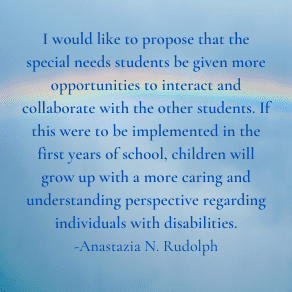
For the past few years, I have found great joy in helping the special needs students at my school. One of my friends has a form of palsy, and uses a wheelchair to move. A lot of the other students will not talk to him; his speech is difficult to understand at times and his sudden movements can be a bit startling. He sits with me at lunch nearly every day, asking me about what movies I like to watch and what I’m doing over the weekend. He really is quite intelligent, but with a body that makes it difficult for him to express himself. I’ll be graduating this year, but I promised him that we’ll keep in touch and that I’ll send him postcards when I travel.
My other friend has autism, meaning that she perceives the world differently than I do. Sometimes this can be difficult for others to understand. When my school had a light show at the homecoming assembly, the flashing colors that were exciting for everyone else were frightening to her. But the people who would push her aside as being “weird” miss the moments of pure joy, when even the smallest gesture means so much to her. They miss the times when she will be absolutely amazed at something so commonplace to anyone else. We will both be graduating this year, and I’m sure we’ll keep in touch with each other.
While I am not alone in my beliefs that individuals with disabilities should be treated as the unique and talented people they are, it is unfortunately not a universal perspective. I have witnessed countless times in which individuals with special needs have been bullied, being insulted for the differences they have no control over and cannot change. Such situations make me incredibly upset, and I have done my best to step in to defend my friends. Yet no matter what I say or do, I cannot change a majority opinion alone. Rather, such a change must take place on a societal level, and must begin at a young age.
In elementary school, the special needs class was isolated from the other classes. On the one hand, this can be a good thing. It allows students with disabilities to learn at their own pace without feeling overwhelmed, and the coursework is based primarily upon life skills instead of academics in order to foster independence. However, this system also creates an attitude among the other students that the special needs class can be “shunned.” Without opportunities for collaboration and understanding, children are more likely to develop the perspective that anyone with a disability should be kept separate from others.
I would like to propose that the special needs students be given more opportunities to interact and collaborate with the other students. If this were to be implemented in the first years of school, children will grow up with a more caring and understanding perspective regarding individuals with disabilities. It is apparent that integrating coursework would not be possible due to differences in the learning process, however what can be done is allow a period of time – once a week, possibly – during which the other students can join the special needs students in activities and games.
It is my belief that with such interaction will come a collective mentality of understanding and of appreciation for unique abilities. Raising new generations under such a system of interaction will yield a culture in which both children and adults living with a disability will have the resources and assistance they need to live a healthy and productive lifestyle. No longer will individuals be outcast based on their appearance, cognitive perception, or medical condition. Rather, they will become part of an inclusive society which truly cares for them and understands their needs.
